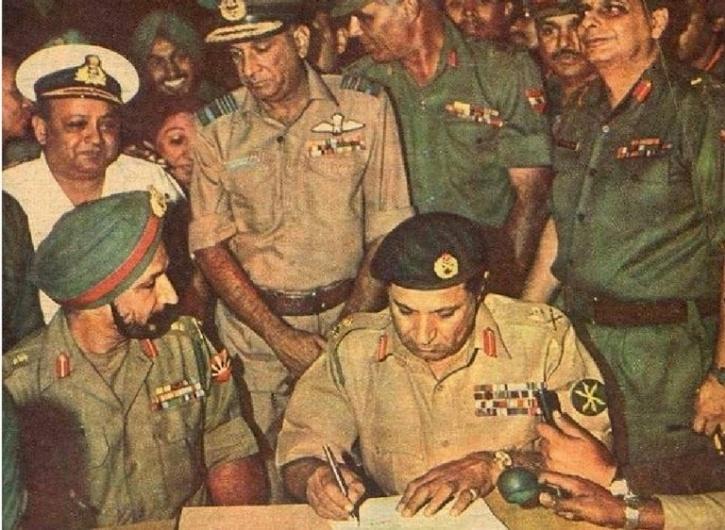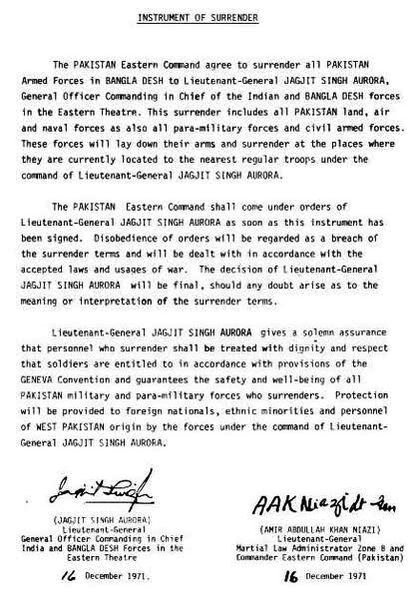
As India celebrates its victory over Pakistan on 16 December, the youth need to understand post-independence historical perspective of the nation and also realise that the freedom they enjoy has come after countless sacrifices
“Oye shera, agar tere varge afsar saadi fauj vich hon tan assi dunia di kisse vee fauj nu kacha kha jaiye” (Hey Tiger, if officers like you were in our army we would eat up any army in this world). This remark was made by a Pakistan prisoner of war in East Pakistan (later Bangladesh) to an Indian officer, Lieutenant (later Lieutenant Colonel) Jasbir Sarai of 1st Battalion, The Jammu and Kashmir Rifles, on culmination of the Indo-Pakistan War, 1971, also known at the Bangladesh Liberation War. One wonders whether this Pakistani soldier was praising Indian Army officers or castigating his own leadership on their faces.
Bangladesh today is a proud, independent nation well on the path to development. Its rapidly improving economy and enduring democracy are its biggest assets. Its relationship with India is on the rise with positive vibes on the Land Boundary Agreement and water sharing. This freedom was won with great sacrifice. The role of the Indian army is providing to the people of Bangladesh the fruits of democracy and freedom is remarkable.
Late Field Marshal Sam Mankeshaw, the then Chief of Army Staff of Indian Army, went on to become a folklore for his firm and righteous stand in the planning and conduct of the war. His actions were in keeping with the highest traditions and strategic requirements and thus gave to India a resounding victory. In the run up to 1971 war, when he visited different garrisons, he would tell his soldiers to respect women in his own inimitable style. “When you feel tempted, put your hands in your pockets and think of Sam Manekshaw,” he said. With this simple statement the COAS laid down the high moral threshold that he expected from his soldiers and they lived up to the standards set.
On the western front, the war of 1971 witnessed many battles where the Indian soldiers exhibited courage and fortitude in the face of great odds and came out victorious, albeit after great sacrifice. Primary among the battles fought in this sector is the Battle of Longewala. This was the first major engagement wherein the enemy launched a massive assault with Armoured and infantry, but was foiled due to the resilient defense by a small contingent of 23 Punjab led by Major (later Brigadier) Kuldip Singh Chandpuri. The enemy, despite overwhelming strength, could not break the defense of this small force and, on the next day, was handed a devastating attrition at the hands of Indian Air Force. The fate of the war in the western sector was decided then and there in favour of India.
The exploits of Brigadier Kuldip Singh Chandpuri and his men have been recorded in an epic Indian movie “Border” which does not fail to bring tears of pride in the eyes of every Indian. Brigadier Chandpuri breathed his last in November this year at the age of 78. He will always be remembered as a true son of India.
The conduct of this war was a true example of the synergized efforts of Government and the Armed Forces with complete support of the people of India. It was the support of the nation that served as an elixir for the soldiers to attain success which has no comparison in the annals of military history.
It was in the aftermath of this war and due to the ignominious defeat suffered by Pakistan that the evil policy of “bleeding India with a thousand cuts” was formulated by the Pakistani Dictator, General Zia-ul-Haq, sometime in 1977. The basis of this policy lied in the conviction that Pakistan cannot beat India in a conventional war, so the best option is to resort to a Proxy War designed to weaken the fabric of Indian constitutional democracy from within.

Jammu & Kashmir, particularly the Kashmir Valley, was chosen as the main battlefield for application of this policy. The porous borders were used to infiltrate brutal mercenaries who spread terrorism and inflict tremendous atrocities on poor and innocent civilians. The Kashmir Pandit community was forced to leave their home and hearth in Kashmir at the point of the gun.
This policy has caused terrible misery to the people of Jammu & Kashmir over four decades but it has not been able to break their will or their determination to remain with the democratic values of their country – India. They have, with complete support of the Indian Army and other security forces, defeated the evil intentions of the enemy. Though the enemy is relentless in pursuit of its evil agenda but the same has been contained. Democracy has taken firm root in the region as has become apparent by the recent successful conduct of the Panchayat elections.
It is hoped that Pakistan and its stooges will read the writing on the wall and understand that it cannot break the fabric of India by any means, fair or foul. No kind of warfare, be it conventional, proxy, asymmetric, kinetic, hybrid or anything else can fructify the evil, fundamentalist ambitions of some self-serving powers based in Pakistan.
India is as strong as it was in 1971 when it responded to Pakistani atrocities on its own land and its own people and won a just and virtuous war. With righteousness always on the side of the Indian Army there is nothing that Pakistan can do to break the sovereignty and integrity of the Indian nation. It would be best for the country to divert its energies inwards to tackle the many serious economic and humanitarian issues that it is facing.
As the Indian nation celebrates culmination of the victorious war on 16 December, the people of India, especially the youth, need to be understand the post-independence historical perspective and realise that the freedom they enjoy has come at a price. Sacrifices did not end with the freedom struggle; they extended way beyond to save the territorial integrity, dignity, democratic values and freedom of the great Indian nation. The new generation must derive motivation from the historic narratives and be prepared to make similar sacrifices in the future so that the nation emerges as strong and indomitable.
